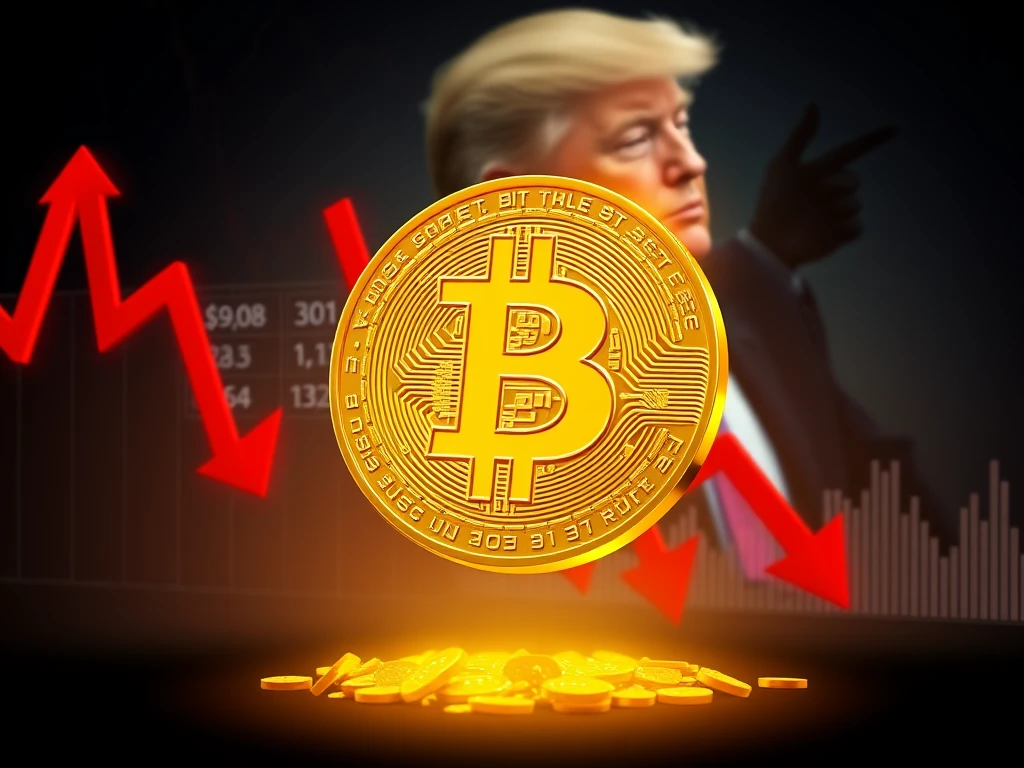Unshakable Bitcoin: Defies Record Stock Sell-Off Amid Trump Tariff Fears

In a stunning display of resilience, Bitcoin has emerged as a beacon of stability amidst a tumultuous stock market. While traditional equities plummeted into a record-breaking sell-off, triggered by the announcement of Trump tariffs, Bitcoin stood its ground, reinforcing its narrative as a potential safe haven asset. Is this a turning point for Bitcoin, solidifying its position as digital gold in times of economic uncertainty? Let’s dive into the details of this fascinating market divergence.
Why is Bitcoin Holding Firm During the Stock Sell-off?
The past few days have witnessed a dramatic downturn in the stock market, with the S&P 500 experiencing its largest two-day drop in history, surpassing even the initial shockwaves of the COVID-19 pandemic. A staggering $5 trillion was wiped off the S&P 500, a direct consequence of former US President Donald Trump’s announcement of reciprocal import tariffs on April 2nd. These tariffs, aimed at addressing the nation’s substantial $1.2 trillion trade deficit and bolstering domestic manufacturing, sent shockwaves through traditional markets.
However, amidst this sea of red, Bitcoin painted a different picture. While stocks were in freefall, Bitcoin experienced a relatively minor dip of just 3.7% over the same period. This divergence has sparked considerable debate and ignited renewed interest in Bitcoin’s role as a hedge against financial instability.
Key Factors Contributing to Bitcoin’s Resilience:
- Decoupling from Traditional Markets: Historically, Bitcoin has often mirrored the movements of risk assets, particularly during macroeconomic shocks. However, this recent event suggests a potential decoupling, indicating a shift in investor perception.
- Fixed Supply Advantage: Unlike fiat currencies, Bitcoin’s capped supply of 21 million coins offers inherent protection against inflationary pressures, which can be exacerbated by tariff-driven economic shifts.
- Growing Institutional Adoption: The advent of Bitcoin ETFs has opened the doors to greater institutional investment, potentially creating a more robust and less volatile market for Bitcoin.
- ‘Digital Gold’ Narrative Strengthens: Bitcoin’s ability to withstand market turmoil reinforces its narrative as ‘digital gold,’ a store of value that is independent of traditional financial systems.
Trump Tariffs Trigger Record Stock Sell-off: A Closer Look
The catalyst for this market upheaval was undoubtedly the announcement of Trump tariffs. These tariffs, reminiscent of trade policies from his previous administration, have reignited fears of trade wars and their potential impact on global economic growth. Investors reacted swiftly, triggering a massive stock sell-off as they sought to mitigate risk in the face of increased economic uncertainty.
| Market Event | S&P 500 Loss | Bitcoin Dip |
|---|---|---|
| Trump Tariff Announcement (April 2nd) | $5 Trillion (over 2 days) | 3.7% (over 2 days) |
| COVID-19 Pandemic Onset (March 2020) | $3.3 Trillion | Significant Drop (correlated with stocks) |
Comparison of Market Reactions to Economic Shocks
As the table illustrates, the magnitude of the recent stock sell-off dwarfs even the market reaction to the initial stages of the COVID-19 pandemic, highlighting the severity of investor concerns surrounding the potential economic repercussions of the Trump tariffs.
Is Bitcoin Truly a Hedge Against Financial Instability?
The million-dollar question remains: does Bitcoin’s recent performance definitively prove its status as a hedge against financial instability? While the data is certainly compelling, some analysts offer a more nuanced perspective.
James Wo, CEO of DFG, points out that Bitcoin’s initial price dip, albeit smaller than stocks, suggests that some investors still perceive it as a risk asset. He argues that the increased institutional exposure through Bitcoin ETFs makes it more susceptible to macroeconomic trends. However, he also acknowledges that Bitcoin’s resilience amidst ongoing uncertainty could solidify its ‘digital gold’ narrative and enhance its reputation as a reliable store of value.
Expert Opinions on Bitcoin’s Market Position:
- Marcin Kazmierczak (RedStone): Believes the divergence signals an “evolution in Bitcoin’s market positioning,” suggesting a potential shift in investor perception.
- Iliya Kalchev (Nexo): Notes Bitcoin’s ability to hold above its $82,000 support level as a sign of “structural demand” remaining intact.
- James Wo (DFG): While acknowledging Bitcoin’s risk asset characteristics, sees its resilience strengthening its ‘digital gold’ narrative.
The Future Outlook: Bitcoin as Digital Gold?
Despite the current market turbulence, analysts remain optimistic about Bitcoin’s long-term prospects. Predictions suggest a significant upside potential for the remainder of 2025, with some estimates projecting Bitcoin to reach $132,000. This bullish outlook is fueled by factors such as the growing money supply and increasing mainstream adoption of cryptocurrencies.
The recent market events, where Bitcoin demonstrated remarkable resilience amidst a historic stock sell-off triggered by Trump tariffs, have undeniably strengthened the argument for Bitcoin as digital gold. While the journey may be volatile, Bitcoin’s unique characteristics, including its decentralized nature and fixed supply, position it as an increasingly attractive alternative asset in an uncertain economic landscape.
As the world grapples with geopolitical tensions and economic shifts, Bitcoin’s performance during this period offers a compelling glimpse into its potential role in the future of finance. Whether it fully realizes its ‘digital gold’ aspirations remains to be seen, but its recent resilience is undoubtedly a significant step in that direction.










